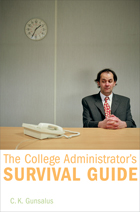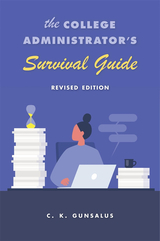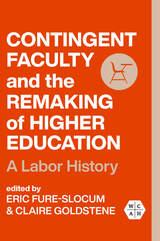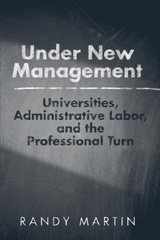
Late one afternoon, as you are organizing your new office as department chair, one of the senior members of the department drops by. He affably informs you of his plans for the coming semester: that contrary to the published class schedule, he only teaches on Tuesday afternoon, Wednesday, and Thursday morning, so as to have the weekends free for travel; that he expects the office staff to start his coffeemaker by 10 a.m. sharp on his teaching days; and that since he hasn’t been assigned a research assistant, his teaching assistant will do research tasks, including errands. What do you say? What do you do?
Never mind budgets or curriculum reform: staff problems can be the most thorny of any academic administrator’s job. Every day, professors who have never run anything bigger than a seminar find themselves in charge of a complex and volatile organization called a Department of English (or Biology, or Sociology, or Textile Marketing). What should they do?
In this book, a widely respected advisor on academic administration and ethics offers tips, insights, and tools on handling complaints, negotiating disagreements, responding to accusations of misconduct, and dealing with difficult personalities. With humor and generosity, C. K. Gunsalus applies scenarios based on real-life cases, examples from negotiation, law, and child-rearing to guide novice (and experienced) academic administrators through the dilemmas of management in not-entirely-manageable environments.

The book that every dean and department chair needs to survive—and thrive—in the twenty-first-century university.
First released in 2006, The College Administrator’s Survival Guide has served as the bible for a generation of provosts, deans, department chairs, and program directors. Shrewd administrators have returned to the guide time and again for C. K. Gunsalus’s advice on handling complaints, negotiating disagreements, and dealing with difficult personalities. Now, in this revised and updated edition, Gunsalus guides rookie administrators and seasoned veterans through today’s most pressing higher-education challenges.
These days academic leaders must respond to heightened demands for transparency and openness. These demands are intensified by social media, which increases the visibility of university conflicts and can foster widespread misinformation about campus affairs. Meanwhile, institutions have become flatter, with administrators expected to work more closely with faculty, students, and a range of professionals even as support staffs shrink. Between the ever-replenishing inbox, the integration of often-exasperating management systems into every dimension of academic life, and the new demands of remote learning, deans and department heads are juggling more balls than ever before. Tightening budgets have already forced administrators into more difficult choices and, in the wake of COVID-19, there will be no relief from financial constraints.
From #MeToo to partisan battles over curricula and funding, college and university leaders need more savvy and greater sensitivity than ever. What hasn’t changed are the challenges of dealing with difficult people and the importance of creating and maintaining environments in which faculty, staff, and students have the support they need to do their best work. The College Administrator’s Survival Guide provides the tools to keep cool and get the job done.

In the United States today, almost three-quarters of the people teaching in two- and four-year colleges and universities work as contingent faculty. They share the hardships endemic in the gig economy: lack of job security and health care, professional disrespect, and poverty wages that require them to juggle multiple jobs.
This collection draws on a wide range of perspectives to examine the realities of the contingent faculty system through the lens of labor history. Essayists investigate structural changes that have caused the use of contingent faculty to skyrocket and illuminate how precarity shapes day-to-day experiences in the academic workplace. Other essays delve into the ways contingent faculty engage in collective action and other means to resist austerity measures, improve their working conditions, and instigate reforms in higher education. By challenging contingency, this volume issues a clear call to reclaim higher education’s public purpose.
Interdisciplinary in approach and multifaceted in perspective, Contingent Faculty and the Remaking of Higher Education surveys the adjunct system and its costs.
Contributors: Gwendolyn Alker, Diane Angell, Joe Berry, Sue Doe, Eric Fure-Slocum, Claire Goldstene, Trevor Griffey, Erin Hatton, William A. Herbert, Elizabeth Hohl, Miguel Juárez, Aimee Loiselle, Maria C. Maisto, Anne McLeer, Steven Parfitt, Jiyoon Park, Claire Raymond, Gary Rhoades, Jeff Schuhrke, Elizabeth Tandy Shermer, Steven Shulman, Joseph van der Naald, Anne Wiegard, Naomi R Williams, and Helena Worthen

Faculty members who care about the institutions of higher education where they work are often at odds with university management. In his forceful book, Under New Management, Randy Martin takes a novel, evenhanded approach to this gulf between professors, who feel a loss of autonomy, and administrators.
Martin imagines a political future for academic labor based on a critical understanding of the administrative work that faculty already undertake. He considers the differences between self-rule and specialized expertise and provides a case study of a New York City public school to show how kids and families respond to the demands of managerial productivity that is part of preparing students for college. Under New Management also considers changes faced by students, faculty, and administrators in light of this reworked social compact of professionals.
READERS
Browse our collection.
PUBLISHERS
See BiblioVault's publisher services.
STUDENT SERVICES
Files for college accessibility offices.
UChicago Accessibility Resources
home | accessibility | search | about | contact us
BiblioVault ® 2001 - 2024
The University of Chicago Press









